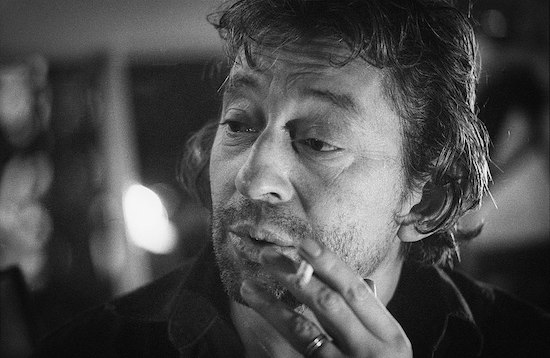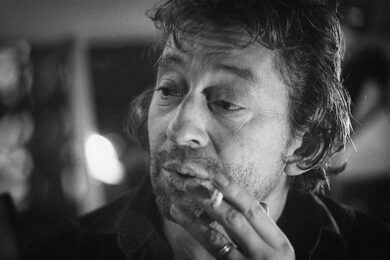© Claude Truong-Ngoc / Wikimedia Commons
“I loved the cozy atmosphere of London studios,” Jean-Claude Vannier, the vaunted arranger of Histoire de Melody Nelson, told Le Monde in 2008. “The carpets were spread out in the studio, so it looked like an apartment. The English musicians of the time were not wild rockers. They mixed their musical modernism with ‘high tea’, a custom that I liked very much. The quality of the musicians did a lot for the record. The next year our bassist, Herbie Flowers, played on ‘Walk On The Wild Side’.”
Vannier conducted versions of Histoire de Melody Nelson and L’enfant assassin des mouches at the Barbican in 2006, with Jarvis Cocker, Mick Harvey, the Super Furry Animals’ Gruff Rhys, and Badly Drawn Boy taking on the vocals, and then repeated the exercise in 2011, this time at the Hollywood Bowl with Beck, Mike Patton, Victoria Legrand from Beach House and Sean Lennon. The big names performed the songs, while the musicians from the record were in attendance to accompany them: Dougie Wright, Herbie Flowers, Vic Flick, and ‘Big’ Jim Sullivan. “Herbie Flowers was a very violent man when he was out and about in the old days, but now he’s like a little old English lady in his demeanour. Incredible,” Vannier tells me, before quickly adding, “Anyway, he wasn’t on the original record.”
The mystery of which musicians actually played on Melody Nelson hasn’t entirely been solved, though some clarity arrived in 2011 courtesy of Tony Frank and an undeveloped roll of film. For the fortieth anniversary of the record, Frank was asked to sift through his photos for additional shots to use for a deluxe repackaged version, and, as he returned to the originals, he came across a spare roll that he took at the time that hadn’t been fully developed. Tony had taken some shots down in the basement at Philips’s Marble Arch studio but never developed them: “I took these pictures of the rhythm section,” he says, “and I took six or seven of Serge in the sound room, but it was so dark at that time, and I couldn’t see anything in the negatives.” When the pictures were finally developed beyond the contact sheets he already had, they caused shock and consternation. Frank had captured the engine room at work, but the men in the photos weren’t Dougie Wright or Herbie Flowers.
The word was out that somebody else was playing bass, and the other session musicians quickly identified Dave Richmond, with a fine pair of fashionable mutton chops, stood there in the studio. The other drummer has remained a mystery since the discovery, despite the best efforts of Andy Votel to identify who was behind the kit that day. Votel co-ordinated a campaign with the remaining session men to check their diaries. For the record, Dougie Wright did play on some of the sessions, alternating with the unknown drummer. “I played on quite a bit, but I didn’t do it all,’ says Wright, over the phone. “I’ll be quite honest about that. It’s doubtful whether everyone did it all, if the truth be known. You get a lot of musicians saying, I was on that, I was on that, I was on that, and you think, Hang on a minute! This is getting silly, to the exclusion of the great players.”
“I did virtually almost everything The Walker Brothers and Dusty Springfield did back then,” says Alan Parker. “Take ‘No Regrets’, for instance. The solo on that song was recorded at the Marquee studios on Wardour Street. I’m credited for it, and about eleven guitarists have claimed it was them.” As well as playing for Gainsbourg, Dougie Wright played with the John Barry Seven, and he met a teenage Jane Birkin when she was married to the bandleader. In the 60s beat boom, Wright was known as the Fourth Walker, such was his proximity to the band. “Scott Walker knew what he wanted, and I think he indisputably had one of the best voices of the 1960s,” says Dougie, who I interviewed a few months before Walker’s death in March 2019. “I think I’m led to believe that he’s gone very surrealistic over the years, and I don’t subscribe to that sort of thing.”
With some session musicians claiming to have been on the record – or having played the Barbican or the Hollywood Bowl under the misapprehension that they were on the original – are these players being dishonest for a quick buck, or has a collective amnesia come over the British equivalent of the Wrecking Crew? Why, if they played on some of the greatest records of the 1960s and 1970s, do they not have any recollection of doing so? The fact of the matter is that most of them played on so many records by so many artists, week in, week out, for so many years, that the sessions bleed into each other in the memory banks. “We weren’t even necessarily told who it was we were playing for,” says Dave Richmond. “The people who you were working for were incidental, really.”
“It’s funny, people say the memory plays tricks on you, and it does, to an extent,” says Dougie Wright. “The reason I remember the hit material I recorded was because it usually got played on Jukebox Jury. And Jukebox Jury usually made it a hit! I made a mental note of all that stuff I was on, and even today, when an introduction starts, I can remember it, and then usually where we recorded it, funnily enough.” Dougie remembers playing on ‘Je t’aime … moi non plus’, but Melody Nelson draws a blank. “There was only one musician who actually had the time and savvy to write down every song title he recorded in the studios. Nobody else ever did that, we just put down the dates of the session. Unfortunately he’s passed away now.”
Even though the musicians didn’t write down separate tracks or artists in their diaries, the fact that they were in the Philips studio on the dates that correlated meant they’d played on the sessions. Big Jim Sullivan played on the early sessions – a fact Vannier can definitely vouch for. “Yes, we recorded first in England with Big Jim. He was a very good guitarist who’s dead now. I found the diary with the meetings of the rendezvous. It’s all there in black and white. We played night and day. Jim Sullivan was completely booked up for months, so I remember we had to wait for him. We played several times with him and Alan Parker.”
“People have done various articles on me where they say I played on this or that,” says Parker. “I say, Did I? The memory is unreliable. When you think, if I started when I was seventeen, that’s about fifty-five years ago or something. Your memory does get a little bit detached from your brain.” (Three years later, Parker played the main line on ‘Rebel Rebel’ which is one he definitely remembers.)
“My great mentor, Andy Votel, must have made about a hundred calls to me checking my diaries,” says Dave Richmond. “He’s done a great service, has Andy Votel, and whatever he says is true. We double checked it in the diary. He was very precise.” Curiously, having been identified as the bassist forty years later, having been unaware he was on the record (and having missed out on the Barbican and Hollywood Bowl), it’s Dave who now has the best memories of the sessions. The famous, much-sampled bass line on ‘Melody’, with the unmistakable bass vibrato at the beginning of the track, came from Richmond following what Parker was doing on guitar: “I had Alan Parker in the cans, and I heard him doing this double-note slide thing on a session we did at Morgan Studios, and I said, How did you do that? So he showed me, and I started doing something similar on bass around that time. So, on ‘Melody’, you probably notice a double-note glissando, and it’s almost in unison but not quite. Of course I could hear Alan in my cans – he was doing a few things like that, so I thought I’d put some in. We were literally just improvising as we went along.”
Dave, who also plays that divine, chunky bass hook on ‘69 année érotique’, remembers being given total freedom to experiment by Gainsbourg and Vannier: “Very often, we were given these very rigid bass parts where the composer wants you to play it note for note. But I very rarely played anything exactly as it was written, and none of us did. You’d get a feel going and then you’d hear something in the drums or the guitar and you’d echo it or compliment it. It was just a thing that you did and you didn’t even think about it.” Alan Parker on the other hand suggests that Vannier could be “a little bit fragile and a little bit grumpy if we changed any of his arrangements”.
If Vannier remembers a genteel atmosphere where the session men would down tools to take high tea, Dave ‘Champagne’ Richmond paints a picture of bacchanalian fraternity, rolling from studio to studio and quaffing as they went. “There must have been about twenty studios – we were just going from one to the other, and there’d be another set of guys there. It was a tremendous social time we had, there was quite a lot of drinking going on with certain members, including myself.” Was that where he got the ‘Champagne’ in his name from? “Yes, that’s right. Especially if we did Chappells, where there was a passage and opposite was Yates’s Wine Lodge. The Champagne was about a pound and ten shillings in old money – £2 for a Moët, but their own champagne was cheaper. At that point we were probably getting about £15 or £20 per session, which was very good going in those days. We were getting three of those envelopes a day.”
The session players were usually paid a decent one-off fee, with cash handed straight over in a money bag: “You declared it, but it came in little envelopes,” says Dave. “They just dished out the cash. Martin Kershaw is reputed to have never opened one of those cash bags – he just used to throw them into a wardrobe. And after a few years he bought himself a flat in Marble Arch with twenty grand. A lot of money in those days.”
Relax Baby Be Cool by Jeremy Allen is published by Jawbone Press



